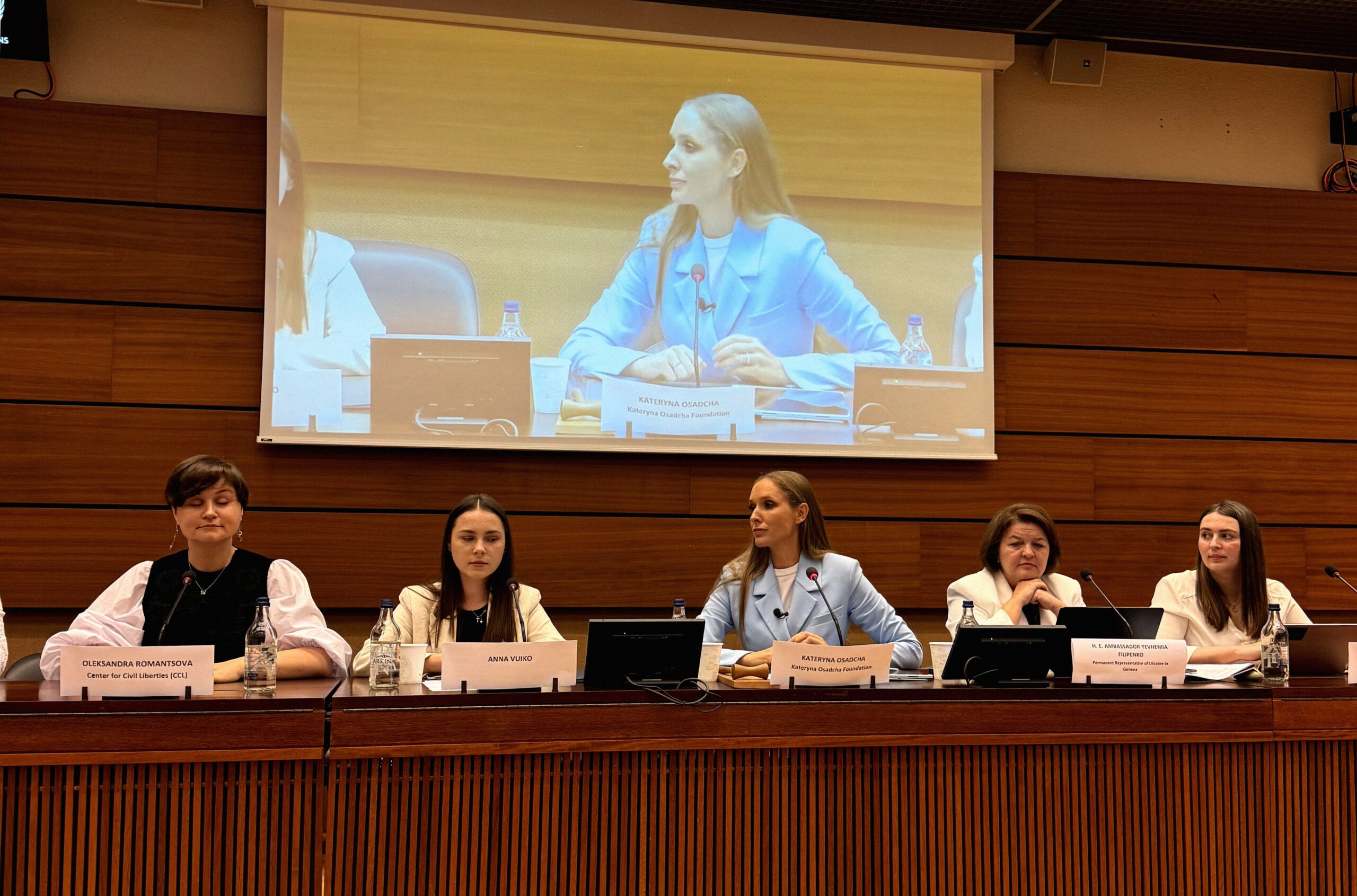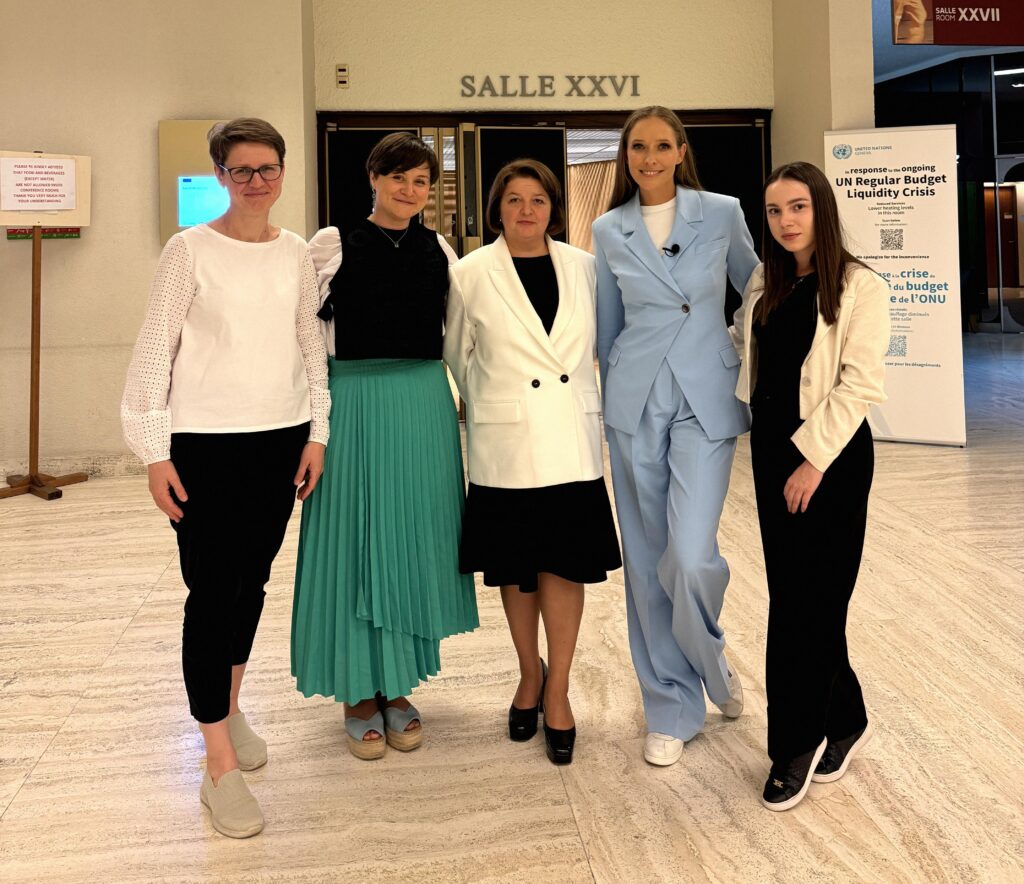“All political and economic power over Russia should be leveraged in order to release Ukrainian civilian prisoners” Enforced disappearances in Ukraine were discussed within the framework of the 56th Session of the UN Human Rights Council

On 4 July, the Center for Civil Liberties, in cooperation with the Kateryna Osadcha Foundation and the International Federation For Human Rights, held a side event “Enforced Disappearances in Ukraine: a Method of Waging War by the Russian Federation” within the framework of the 56th Session of the UN Human Rights Council in Geneva. All the member states of the United Nations were invited to attend to raise their awareness of enforced disappearances and, in particular, of civilians kept in captivity.
Although international humanitarian law severely prohibits hostage-taking, at least 7,000 Ukrainian civilians are arbitrarily detained in Russia. According to the Fourth Geneva Convention, civilians should be treated as “protected persons”, which would guarantee their unconditional release. However, in captivity, Ukrainians are tortured and ill-treated, denied access to light, food, water and medicines that they require to sustain their lives, as well as any opportunities to contact their dear ones. The process of their release is extremely slow and complicated, as Russia conceals information on whereabouts and the status of illegally detained civilians and deliberately denies the ICRC and the relevant UN agencies access to them.
At the event, the international audience listened to two stories from people directly affected by the Russian war crime of enforced disappearance. The first was from a woman who survived all the horrors of Russian captivity, and the second was from a girl who, for over two years, has been desperately trying to get her father, a civilian with a disability, released.
Such stories cannot remain unheard as many broken lives stand behind each unlawfully detained individual. The international community should become aware of how serious the situation is and mobilize their efforts to ensure that all Ukrainians detained incommunicado are released without any additional conditions and that those responsible are brought to justice.

“The capture of civilians by Russia is a unique situation and a challenge for international humanitarian law, as it gives no guidance on what to do in such cases. By the same token, there is no answer about what to do when one of the sides completely ignores the provisions of international law. We need new IHL rules and new instruments capable of bringing the aggressor to international justice. We should leverage all political and economic power over the Russian Federation to release Ukrainian civilian prisoners. After all, unless justice prevails, this situation will spread even more,” Oleksandra Romantsova, the Executive Director of the Center for Civil Liberties, pointed out.
The Center for Civil Liberties offered potential solutions to address the existing legal gaps and increase pressure on Russia, as well as emphasized that compliance with the International Convention for the Protection of All Persons from Enforced Disappearance should be guaranteed.
“We hope that first-hand stories will prompt the United Nations and its member states to act faster, exercise pressure, introduce more sanctions and also personal sanctions against those Russians who have been inflicting torture and violating human rights in Ukraine for over ten years.
A week ago an important event occurred when, with the support from the Holy See, civilians who had been detained by Russia as far back as from 2014, were returned to Ukraine. It is possible to move forward with these small steps, and we look forward to it. Of course, returning everyone in one exchange is an ultimate dream.
People who attended the 56th Session of the UNHRC wondered what the sense of all that was. Why does Russia pack its prisons with people whom it is not able to exchange? The reason why Russia takes civilians right off the streets is a mystery to the world. Now they say in the United Nations that, among other things, new prisons are being built in Russia. In particular, those who stay in the occupied territories should be aware that at any moment they can come for everyone. We need to stop this and people should be brought back”, Kateryna Osadcha said.

This activity is funded by the European Union. Its results are the sole responsibility of the Center for Civil Liberties and do not necessarily reflect the views of the European Union.

